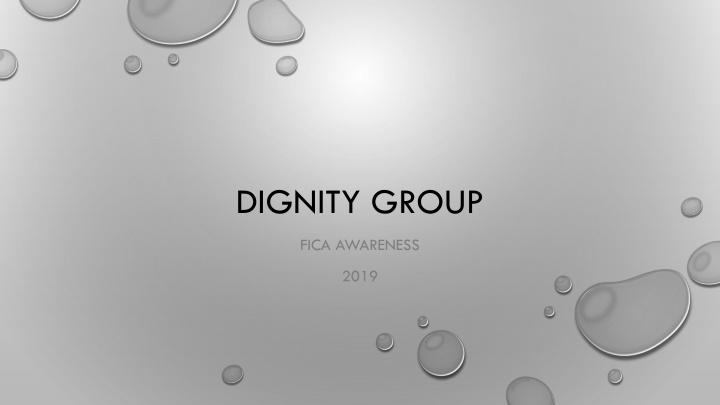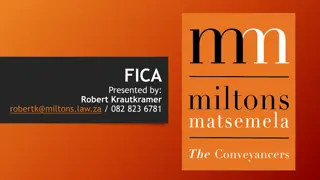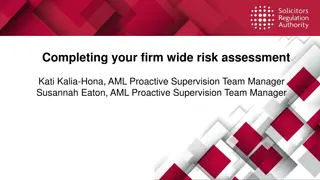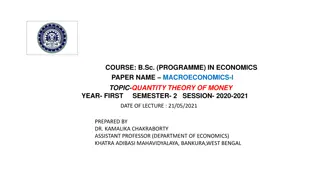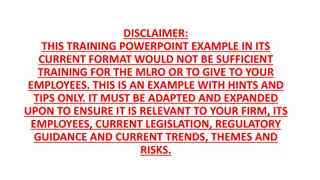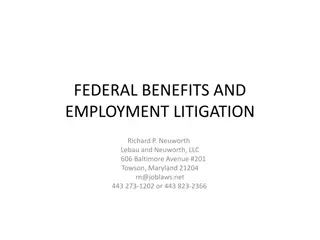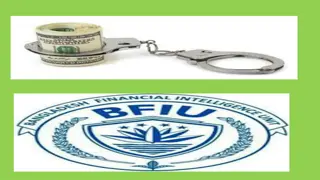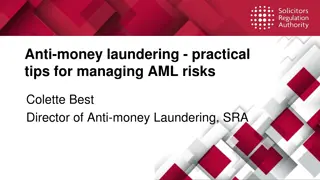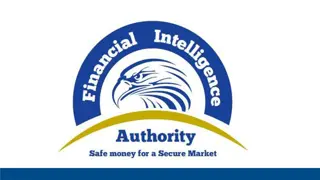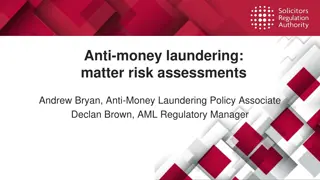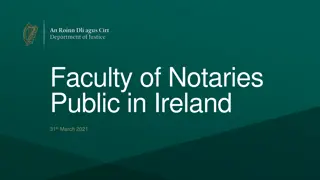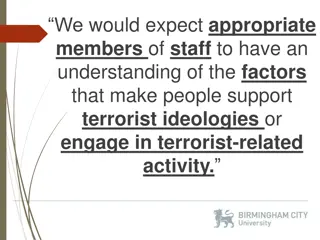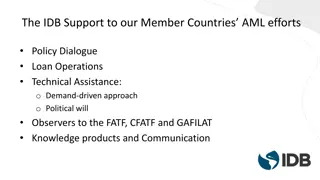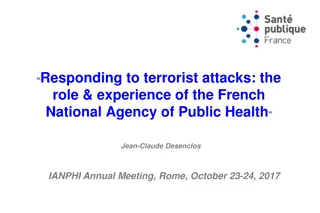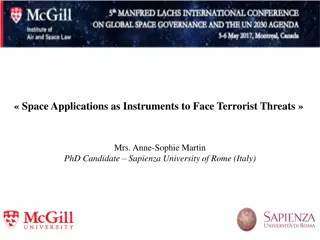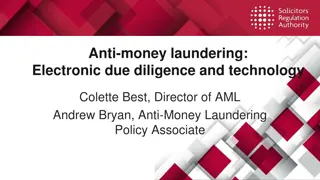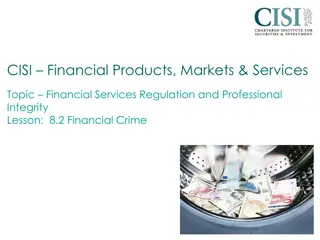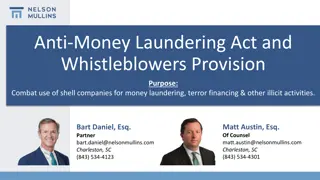FICA Awareness 2019: Understanding Money Laundering and Terrorist Financing Process
This module covers key areas related to money laundering and terrorist financing, including AML legislation in South Africa, obligations of accountable institutions, reporting requirements, and more. Explore the illegal processes of money laundering and terrorist financing, understanding placement, integration, and layering phases of money laundering, and the implications of terrorist financing. Gain insights into the risk-based approach required from accountable institutions, suspicious report requirements of FICA, and record-keeping obligations. Enhance your knowledge to combat financial crimes effectively.
Download Presentation

Please find below an Image/Link to download the presentation.
The content on the website is provided AS IS for your information and personal use only. It may not be sold, licensed, or shared on other websites without obtaining consent from the author.If you encounter any issues during the download, it is possible that the publisher has removed the file from their server.
You are allowed to download the files provided on this website for personal or commercial use, subject to the condition that they are used lawfully. All files are the property of their respective owners.
The content on the website is provided AS IS for your information and personal use only. It may not be sold, licensed, or shared on other websites without obtaining consent from the author.
E N D
Presentation Transcript
DIGNITY GROUP FICA AWARENESS 2019
MODULE INTRODUCTION KNOWLEDGE THE FOLLOWING AREAS WILL BE COVERED: THE MODULE COVERS THE FOLLOWING UNITS: UNIT 1: MONEY LAUNDERING AND TERRORIST FINANCING UNIT 2: AML LEGISLATION IN SOUTH AFRICA UNIT 3: OBLIGATIONS OF ACCOUNTABLE INSTITUTIONS UNIT 4: REPORTING
MODULE INTRODUCTION ONCE YOU HAVE COMPLETED THIS MODULE YOU WILL BE ABLE TO: MODULE OUTCOME 1: UNDERSTAND WHAT IS MEANT BY MONEY LAUNDERING AND TERRORIST FINANCING ; MODULE OUTCOME 2: DISCUSS THE REQUIREMENTS OF THE AML/ CFT LEGISLATION IN SOUTH AFRICA; MODULE OUTCOME 3: UNDERSTAND AND APPLY THE RISK-BASED APPROACH REQUIRED FROM ACCOUNTABLE INSTITUTIONS; MODULE OUTCOME 4: UNDERSTAND THE VARIOUS SUSPICIOUS REPORT REQUIREMENTS OF FICA; AND MODULE OUTCOME 5: UNDERSTAND AND APPLY THE RECORD-KEEPING OBLIGATIONS OF ACCOUNTABLE INSTITUTIONS.
FICA AWARENESS: UNIT 1- MONEY LAUNDERING AND TERRORIST FINANCING MONEY LAUNDERING AND TERRORIST FINANCING 1. Money laundering is the illegal process of concealing the origins of money obtained illegally by passing it through a complex sequence of banking transfers or commercial transactions. The overall scheme of this process returns the money to the launderer in an obscure and indirect way. Terrorism - Terrorism involves a criminal act that is often symbolic in nature and intended to influence an audience beyond the immediate victim or, - The unlawful use of violence and intimidation, especially against civilians, in the pursuit of political aims Terrorist financing The financing of terrorism involves providing finance or financial support to individual terrorists or non-state actors. Examples: ISIS terrorists - ISIS steals livestock; sells foreign fighter passports; taxes minorities and farmers and truckers; runs a sophisticated extortion racket; kidnaps civilians for ransom payments; loots antiquities; and much more. It also makes about $40 million a month from illicit oil sales alone
FICA AWARENESS: UNIT 1- MONEY LAUNDERING AND TERRORIST FINANCING PROCESS OF MONEY LAUNDERING Placement - Placing the money in to circulation. E.g. banking using smaller structured deposits, blending of funds, false invoicing Illegal sources of income E.g. Theft, drugs, Corruption, fraud Integration the process of re- introducing funds into the system with an apparently legitimate source. E.g. purchase of luxury assets, financial & commercial investments Layering The process of making it more difficult to detect money laundering. E.g. Wire Transfer of funds between accounts, investment in money instruments, loan out to company A followed by false invoice charged to Co A.
FICA AWARENESS: UNIT 1- MONEY LAUNDERING AND TERRORIST FINANCING Terrorist financing has a momentous impact on both a national and global level. Every South African needs to be aware of the devastating socio-economic and human rights implications of money laundering and the financing of terrorism. CONSEQUENCES OF MONEY LAUNDERING AND TERRORIST FINANCING Discourage foreign investments distort international capital flows draining resources from more productive economic activities Loss of revenue Security and reputational threats Loss of control of economic policy
FICA AWARENESS: UNIT 2 AML LEGISLATION IN SA Investigating how the requirements to prevent both terrorist financing and anti-money laundering will be imposed on the role-players by the FIC act. AML/ CFT LEGISLATION IN SOUTH AFRICA There are three important pieces of South African legislation that have been enacted to drive anti-money laundering (AML) and countering the financing of terrorism (CFT) in South Africa. These are: THE FINANCIAL INTELLIGENCE CENTRE ACT 38 OF 2001 (FICA); THE PREVENTION OF ORGANIZED CRIME ACT 121 OF 1998 (POCA); AND THE PROTECTION OF CONSTITUTIONAL DEMOCRACY AGAINST TERRORISM AND RELATED ACTIVITIES ACT 33 OF 2004 (POCDATARA).
FICA AWARENESS: UNIT 2 AML LEGISLATION IN SA A financial system to combat money laundering and terrorist financing works effectively if it: 1. Is transparent; 2. Is based on tough customer due diligence (CDD) measures; 3. Ensures that adequate information is captured in accountable institutions records; and 4. It must make possible the sharing of information that may support further investigation of money laundering and terrorist financing
FICA AWARENESS: UNIT 2 AML LEGISLATION IN SA THE FINANCIAL INTELLIGENCE CENTRE ACT 38 OF 2001 (FICA) - Enacted to introduce greater transparency into the financial system - It provides the legal framework that supports the administration of the criminal justice system - assist in the identification of the proceeds of unlawful activities - combat money laundering and - combat the financing of terrorist and related activities. - Acts as a national point for the gathering, analysis and distribution of financial intelligence. - Develops and provides financial intelligence to law enforcement and other local and international agencies supporting the investigation and prosecution of criminal activity.
FICA AWARENESS: UNIT 2 AML LEGISLATION IN SA VALUES UNDERLYING THE FIC ACT The values underlying the FIC act include fostering transparency, integrity and ethical practice. Apart from criminalizing the activities constituting money laundering, South African law also contains a number of control measures aimed at facilitating the detection and investigation of money laundering. These control measures, as contained in the FIC act, are based on three basic principles of money laundering detection and investigation: Accountable institutions must know with whom they are doing business; The paper trail of transactions must be preserved; and Possible money-laundering transactions must be brought to the attention of the financial intelligence centre (the centre) and the investigating authorities.
FICA AWARENESS: UNIT 2 AML LEGISLATION IN SA ADOPTING A RISK-BASED APPROACH The FIC act recognizes that the risk of money laundering and terrorist financing can vary by individual, business sector and within sectors. Therefore, it requires accountable institutions to apply a risk-based approach to customer due diligence. This approach incorporates three key elements: Strengthening AML/ CFT through a more consultative approach, based on partnerships between key stakeholders in both the public and private sectors. Improving co-ordination and collaboration to ensure more effective preventive and better enforcement measures. A more customer-friendly and cost-efficient approach to implementation of AML/ CFT.
FICA AWARENESS: UNIT 2 AML LEGISLATION IN SA THE PLAYERS IN THE AML/ CFT: There are various players in the AML/ CFT arena in terms of the FIC act. These include: 1. Supervisory bodies and 2. Accountable institutions The FIC act empowers various supervisory bodies to supervise compliance with the FIC act by accountable institutions under their control. These include: 1. The Estate Agency Affairs Board; 2. The South African Reserve Bank; 3. The National Gambling Board; 4. The Financial Sector Conduct Authority; and 5. Law societies referred to in section 56 of the Attorneys Act.
FICA AWARENESS: UNIT 2 AML LEGISLATION IN SA ACCOUNTABLE INSTITUTIONS: The FIC act requires accountable institutions, as defined in the act, to follow implement certain control measures and report suspicious activities or unusual transactions and cash transactions above the prescribed limit in the combating of money laundering. The definition in the act includes the following: 1. A financial services provider (FSP) authorized in terms of the financial advisory and intermediary services act 37 of 2002 (the FAIS act). 2. An estate agent, as defined in the Estate Agency Affairs Act 112 of 1976. 3. A person who carries on a business in respect of which a gambling license is required to be issued by the National Gambling Board or a provincial licensing authority 4. A person who carries on the business of a bank , as defined in the Banks Act 94 of 1990. 5. An attorney, as defined in the Attorneys Act 53 of 1979. 6. A person who carries on a long-term insurance business , as defined in the Long-term Insurance Act 52 of 1998. 7. A person who carries on the business of dealing in foreign exchange.
FICA AWARENESS: UNIT 3 OBLIGATIONS OF ACCOUNTABLE OBLIGATIONS OF ACCOUNTABLE INSTITUTIONS: The FIC act creates various money-laundering and terrorist-financing control obligations for accountable institutions, which include: To perform customer due diligence. To retain customer due diligence and transaction records. To report certain transactions to the Centre and to prevent unauthorized access to information. To formulate and implement an AML and CFT Risk Management and Compliance Programme (RMCP), and train their employees. To appoint a person with adequate seniority and experience to assist with ensuring compliance with the FIC Act. Accountable institutions that fail to comply with their obligations may, therefore, be subjected to corrective action by their supervisory body in addition to being prosecuted for the offences linked to non-compliance.
FICA AWARENESS: UNIT 3 - OBLIGATIONS OF ACCOUNTABLE PREVENTION OF ORGANIZED CRIME ACT 121 OF 1998 (POCA): Its purpose is to criminalize racketeering confiscation and forfeiture of proceeds from unlawful activities. racketeering and money laundering in general, as well as to create a mechanism for the Racketeering - operating an illegal business or scheme (a racket), such as bribery, illegal gambling or drug trafficking. The Act has also created an obligation for any business that comes into possession of property associated with unlawful People engaging in money laundering transactions can be charged under POCA. THE RELATIONSHIP BETWEEN THE FIC ACT AND POCA FICA complements POCA, and provides an administrative framework for combating money laundering. POCA defines the money-laundering offences, whilst FICA prescribes the measures to be implemented to control and prevent money laundering.
FICA AWARENESS: UNIT 3 - OBLIGATIONS OF ACCOUNTABLE THE RELATIONSHIP BETWEEN THE FIC ACT AND POCA SCENARIO QUESTION: Mr. C is a licensed financial services provider, and is also a silent partner in a local nightclub. His partner, Mr. D, has been earning extra money through drug trafficking at the club. He uses these proceeds to purchase a single premium endowment policy from Mr. C; who, in turn, earns commission on this large cash transaction. Mr. C is fully aware of the origin of the money invested, but he is earning a very good living off transactions such as these, so he has no intention of ever reporting this deal. SOLUTION: If caught, both Mr. C and Mr. D will be charged under POCA. Why? Mr. D contravened POCA as he knowingly laundered the proceeds of an unlawful activity. Mr. C also contravened POCA in that he proceeded with the selling of the endowment policy with the knowledge that the money used to initiate this policy was derived from unlawful activities. Mr. C has also contravened the FIC act, as he failed to report the suspicious transaction.
FICA AWARENESS: UNIT 3 - OBLIGATIONS OF ACCOUNTABLE PROTECTION OF CONSTITUTIONAL DEMOCRACY AGAINST TERRORISM AND RELATED ACTIVITIES ACT 33 OF 2004 (POCDATARA) POCDATARA addresses a wide range of issues related to the combating of terrorism. The provisions of POCDATARA must be read in conjunction with the relevant provisions of POCA and FICA. POCDATARA creates its own reporting obligations, but also amended the FIC Act by: 1. inserting a new reporting provision in respect of property associated with terrorism and related activities; and 2. extending the duty to report suspicious and unusual transactions to transactions that are known to be, or suspected of being, linked to terrorist financing.
FICA AWARENESS: UNIT 3 - OBLIGATIONS OF ACCOUNTABLE COMBATING MONEY LAUNDERING AND TERRORIST FINANCING (ML/ TF) Accountable institution are more likely to be targeted by criminals for money laundering and terrorist financing (ML/ TF) purposes. To manage these risks, each accountable institution is required to develop a Risk Management and Compliance Programme (RMCP). What is a Risk Management and Compliance Programme (RMCP)? What is a Risk Management and Compliance Programme (RMCP)? - establishes guidelines and procedure to ensure full compliance with the FIC Act in identifying, measuring, monitoring, managing and reporting the material risks to which the enterprise may be exposed. Provide for the manner in which and the processes by which the institution deals with all its due diligence, record-keeping and reporting obligations. Appropriate training on money laundering and terrorist financing. Ensures that employees are aware of and understand their legal and regulatory responsibilities and their role in ML/ TF risk management and handling criminal property. Appropriate provision of regular and timely information to senior management. Documentation of risk management policies and procedures. Descriptions of the different categories of customer due diligence (CDD) and other risk management measures. Descriptions of escalation of decision-making to higher levels of seniority, where necessary.
FICA AWARENESS: UNIT 3 - OBLIGATIONS OF ACCOUNTABLE HOW DOES AN RMCP IMPACT ON THE EMPLOYEES OF AN ACCOUNTABLE INSTITUTION? 1. Employees follow the company s RMCP policies and procedures to minimize the risks of money laundering and terrorist financing. Key areas that employees of accountable institutions need to familiarize themselves with include: Key areas that employees of accountable institutions need to familiarize themselves with include: 2. Carrying out customer due diligence (CDD) by Understanding and obtaining information when establishing a new business relationship How to establish new business relationship: How to establish new business relationship: - must establish, from a prospective client, what the nature and intended purpose of the business relationship will be. They will also need to obtain information on the source of funds that the prospective client expects to use in the course of the business relationship. - establishing and verifying the identity of all prospective clients - cash-threshold reporting; 3. Suspicious- and unusual-transaction reporting; 4. Reporting on property that is linked to terrorism; and 5. Record-keeping in terms of the FIC Act.
FICA AWARENESS: UNIT 3 - OBLIGATIONS OF ACCOUNTABLE SINGLE TRANSACTION A woman comes into a bank to deposit R6 000 into her brother s account for his birthday. She is not a client of this bank, so there is no business relationship between them. This once-off transaction is, therefore, considered as a single transaction. She might only come in again at the same time next year, but this still does not constitute a business relationship What type of information is required? This is based on the accountable institution s RMCP. Employees of accountable institutions need to know what its RMCP specifies for collecting client identity information. Various types of information about each client needs to be collected and verified: 1. Full names and date of birth; 2. Unique identifying number issued by a government source, e.g. identity or passport numbers. 3. tax number 4. residential address 5. Place of birth 6. contact details
FICA AWARENESS: UNIT 3 - OBLIGATIONS OF ACCOUNTABLE Verifying the information: Verifying the information: The information collected needs to be verified Methods of verification should be documented in the RMCP of the accountable institutions. Procedures to follow when the required information is not available or appropriate: Procedures to follow when the required information is not available or appropriate: Identify the point at which the verification should be completed. Know at which point to conclude that the required information is not available, or the institution is not able to conduct appropriate CDD. Determine the way in which an existing business relationship will be terminated if the CDD requirements cannot be completed. Not every client requires the same level of CDD: Not every client requires the same level of CDD: Enhanced CDD on high-risk clients, products or services The level of CDD on high-risk clients, products or services will depend on risk ratings set in place by the accountable institution.
FICA AWARENESS: UNIT 3 - OBLIGATIONS OF ACCOUNTABLE THE PROCESS OF ENHANCED DUE DILIGENCE The accountable institution needs to provide systems and controls to ensure that more information about its clients is obtained. It also requires more secure confirmation of clients information and closer scrutiny of the clients transaction activities, where the risk of abuse is assessed to be higher. Measures that may be applied in cases of higher ML/ TF risk include Measures that may be applied in cases of higher ML/ TF risk include: Increased automated transaction monitoring; Increased intensity of CDD measures; Increased review periods of client information; Utilizing more or higher quality sources for the vetting of information; Senior management involvement in decisions to on-board clients; Dedicated specialist staff managing enhanced due diligence for specific clients; Limited reliance on another accountable institutions controls.
FICA AWARENESS: UNIT 3 - OBLIGATIONS OF ACCOUNTABLE CLIENTS WHO REQUIRE ENHANCED CDD PROCEDURES: Business relationships must always be considered as high-risk; Domestic prominent influential persons; Foreign prominent public officials e.g. head of state, presidents, member of the foreign royal family, foreign government minister Legal persons, trusts and partnerships.
FICA AWARENESS: UNIT 3 - OBLIGATIONS OF ACCOUNTABLE SECTION 21C: ONGOING DUE DILIGENCE: ongoing due diligence measures follow on from the obligation to understand the purpose and intended nature of a business relationship. particular attention must be paid to complex or unusually large transactions, and all unusual transaction patterns which have no apparent business or lawful purpose. ongoing due diligence measures include: 1. scrutiny of all transactions during the course of the business relationship. 2. to ensure that client information on the accountable institution s system is still accurate and relevant. 3. are the transactions consistent with the accountable institution s knowledge of the client? 4. are they consistent with the client s business and risk profile? 5. the source of funds may need to be verified. 6. analysis of whether there are grounds to report a suspicion of money laundering or terrorist financing.
FICA AWARENESS: UNIT 4 - REPORTING CASH-THRESHOLD REPORTING: Cash-threshold reporting is an important reference point to determine cash movements in the financial system. It also provides a paper trail of the movement of cash, to assist law enforcement authorities in their fight against crime. The obligation to report extends to cash in excess of the prescribed amount being paid out or received by the accountable or reporting institution. The obligation to report arises when a cash transaction, or series of aggregated cash transactions, is concluded with a client, a person acting on behalf of the client, or a person on whose behalf the client is acting, in excess of a prescribed amount The cash threshold is R24999 R24999. The relevant report for one cash transaction is known as a cash threshold report (CTR). Aggregated cash threshold transactions Aggregated cash threshold transactions - multiple cash payments of R25 000 and more, received within a period of 24 hours. The relevant report is Cash Threshold Report Aggregation (CTRA). are suspected of being structured to evade reporting, it must submit a Suspicious and unusual Transaction Report (STR) as well as a CTRA. The report should be sent to the centre no later than 2 days after becoming aware of the cash transaction or series of transactions that have exceeded R24999. It is, therefore, prudent and expected that accountable institutions monitor their bank accounts daily.
FICA AWARENESS: UNIT 4 - REPORTING SECTION 29: SUSPICIOUS AND UNUSUAL TRANSACTION REPORTING This is an essential element of AML/ CFT. What is a suspicious or unusual transaction? What is a suspicious or unusual transaction? It is any transaction where there is reasonable ground to suspect that the accountable institution has received or is about to receive the proceeds of unlawful activities. This also includes activities related to an offence of the financing of terrorist and/ or related activities. An accountable institution must report its knowledge or suspicion to the Centre whenever: for example, multiple cash deposits under the aggregated cash threshold limit. Any transaction with no apparent business or lawful purpose.
FICA AWARENESS: UNIT 4 - REPORTING SECTION 29: SUSPICIOUS AND UNUSUAL TRANSACTION REPORTING (CONTINUED) FOUR CATEGORIES RELATING TO KNOWLEDGE OF POTENTIAL MONEY LAUNDERING WERE HIGHLIGHTED: A. KNOWLEDGE For example a bank employee will only commit a money laundering offence if he/ she knows or ought reasonably to have known that the transaction involved proceeds of crime. B. KNOWS A FACT In terms of the money laundering legislation, a person knows a fact: When he/ she actually knows the fact. When he/ she is wilfully blind to the fact ( turns a blind eye to that fact ). When he/ she has positive, personal knowledge of that fact. C. WILFULLY BLIND The person suspects the fact, but deliberately refrains from verifying that suspicion because he/ she does not want to know the truth. D. NEGLIGENTLY IGNORANT The person sees signs pointing to the truth, but does not take action. The law uses the phrase ought reasonably to have known.
FICA AWARENESS: UNIT 4 - REPORTING WHAT ARE THE INDICATORS OF POTENTIALLY SUSPICIOUS AND UNUSUAL TRANSACTIONS? THE FIC ACT OUTLINES VARIOUS INDICATORS THAT MAY BE HELPFUL WHEN EVALUATING TRANSACTIONS: The FIC Act outlines various indicators that may be helpful when evaluating transactions: a. Knowledge of reporting or record- keeping requirements Where a client: Tries to convince the employee not to complete any documentation required for the transaction. Makes enquiries that could indicate that he/ she is trying to avoid reporting. Is unusually knowledgeable about the law on suspicious-transaction reporting. Is quick to volunteer that the funds are clean or not being laundered a. Unusual transactions Deposits of funds which the client then requests immediate transfer elsewhere Large cash deposits and immediate withdrawals. Unjustified involvement of trusts in transactions Surrendering of policies shortly after they have been purchased Deliberate payment of funds into the wrong bank account. Purchasing of shares at prices that are significantly higher or lower than market prices a. Irregular movement in and across accounts Constant movement of money across products Abnormal settlement instructions, including payment to apparently unconnected parties. Where a client s account reflects frequent inward international transfers, some of which are for large amounts. He immediately withdraws the amounts in cash. a. Transactions that do not match the client s financial standing Clients suddenly making investments in large amounts when they do not have the money to do so. Transactions on a client s account that do not match his/ her income levels.
FICA AWARENESS: UNIT 4 - REPORTING a. Identification The use of a seemingly false identity or alias A client providing doubtful or vague identification information. A client refusing to produce personal identification documents. A client only submitting copies of personal identification documents. Where all identification is foreign and cannot be checked for some reason. a. Other suspicious client behavior Where a client won t disclose his/ her source of funds when asked to do so. Where a client uses a bank branch that is far away from his/ her home or workplace. a. Suspicious employee behavior When an employee s lifestyle changes suddenly, for example, he/ she starts to frequent expensive restaurants or buys designer outfits which he/ she could not afford previously When an employee is suddenly, inexplicably eager to work overtime or take on additional work.
FICA AWARENESS: UNIT 4 - REPORTING WHEN TO SUBMIT THE REPORT A suspicious and unusual transaction report (STR) can relate to a particular transaction or a series of transactions. What is the prescribed time period for submitting an STR to the Centre? This period must not be longer than 15 (fifteen) days, excluding Saturdays, Sundays and public holidays.
FICA AWARENESS: UNIT 4 - REPORTING WHAT CAN EMPLOYEES DO TO BE VIGILANT? Employees of an accountable institution should: be alert for anything unusual or suspicious in the business relationship, as well as business and single transactions. check for suspicious client behavior. check client documentation. verify information provided by the client. follow their organization's RMCP. ask the necessary questions; for example, about the source of funds in the case of an unusual transaction. if an employee has the slightest suspicion or hunch that something is irregular, he/ she must take responsibility and report it.
FICA AWARENESS: UNIT 4 - REPORTING REPORTING ON PROPERTY THAT IS LINKED TO TERRORISM an accountable institution is required to file a report with the Centre if it knows that it possesses or has under its control property linked to terrorism, or to entities that are sanctioned according to the provisions of the POCDATARA act. TERRORIST PROPERTY REPORT (TPR) This is a report that relates to property which is under an accountable institution s control, and is known to be connected to the financing of terrorist activities. Once an institution files such a report, they will be required to freeze the client s property and cease to conduct business with the entity in question. If it fails to do so, this is an offence, and it can be charged under Section 4 of the POCDATARA Act. A report must be sent to the Centre as soon as possible, but no later than 5 (five) days after the accountable institution or any of its employees, have established that the accountable institution has property associated with terrorist and related activities, in its possession or under its control. Record-keeping is an essential component of a successful system to combat money laundering and terrorist financing.
FICA AWARENESS: UNIT 4 - REPORTING CLIENT DUE DILIGENCE RECORDS The accountable institution must keep records of all the information obtained, as per the requirements of section 21 of the FIC act (identification of clients and other persons). these records must include: 1. Copies or references to information obtained to verify a person s identity; 2. The information obtained concerning: the nature of the business relationship; its intended purpose; the source of funds that are expected to be used in concluding transactions during the business relationship
FICA AWARENESS: UNIT 4 - REPORTING CLIENT DUE DILIGENCE RECORDS (CONTINUATION) Transaction records Transaction records accountable institutions must keep transaction records of single transactions, as well as transactions concluded during the business relationship with the client. Transaction records must be sufficient to enable the transaction to be reconstructed. it must include: amount; currency; date of transaction; parties to the transaction; nature of the transaction; pertinent or relevant business correspondence; and identifying particulars of all accounts and account files.
FICA AWARENESS: UNIT 4 - REPORTING RECORD RETENTION PERIODS An accountable institution must keep the prescribed records for: 1. The establishment of a business relationship The establishment of a business relationship For at least five years from the date on which the business relationship is terminated. 2. A concluded transaction A concluded transaction For at least five years from the date on which that transaction is concluded. 3. Suspicious and unusual transactions Suspicious and unusual transactions For at least five years from the date on which the report was submitted to the Centre.
